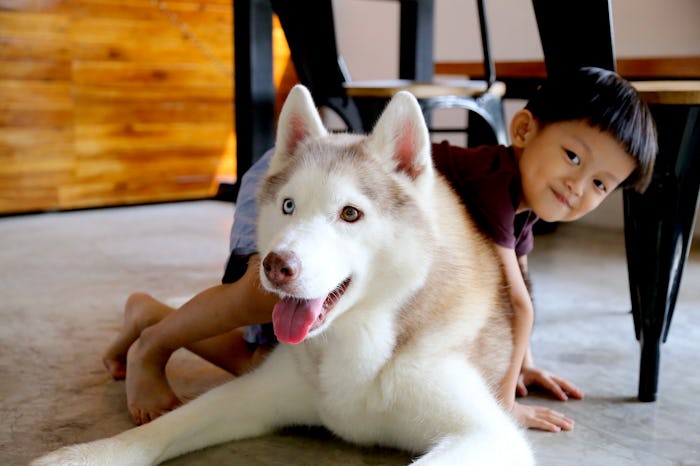Life

So If Your Kid Gets Worms, You Can Probably Blame The Dog
It goes without saying that your pet is part of your family. More than likely, you probably consider your dog or your cat to be like one of your kiddos — except furrier. So it might come as a surprise to learn that during a snuggle sesh, something could happen that might make your child sick. That’s right, when your pet serves up those sweet sloppy kisses, he might also pass on something more sinister (and frankly, gross) to your kids, too — worms. If you’re worried about how kids get worms, read on to find out how to prevent this problem from happening.
Toxocariasis (or more commonly known as worms) is an infection that people can get from their dogs or cats. It comes from worms that live in your pet’s intestines and then are passed on to pet owners, Kids Health reported. “Dogs and cats — especially puppies and kittens — are commonly infected with roundworms and hookworms unless they are on an effective deworming protocol,” Dr. Jennifer Coates, DVM, tells Romper. “Both of these intestinal parasites shed eggs in the pet’s feces that contaminate the environment.”
So the question is: how do people actually get worms? Well, it all comes down to dirt. Kids can come into contact with the infected eggs via dirt or other tainted materials, like sand in a sandbox. But more often than not, it’s probably your butt-licking dog or cat that’s to blame. “Kids get worms from playing with a dog who has been licking their butt,” Dr. Sara Ochoa, DVM, a veterinarian in Texas, tells Romper. “The dog may lick the child’s hands or lick their face, transferring these nasty parasite eggs to your kids.”
Obvs, pet owners of all ages have a greater chance of being exposed to Toxocariasis, but children are especially at risk for getting worms. “Kids are more likely to put their dirty hands in their mouths before washing them, so they are usually more susceptible,” Dr. Alison Mitzner, a board certified pediatrician, tells Romper. Once the infected eggs enter a person’s body, the larvae can migrate to other organs in the body, like the lungs, liver, heart, or even the brain, Kids Health also reported. Although the larvae won’t actually evolve into worms in a human being, they can still do damage to the body.
If the idea of infected larvae isn’t enough to make your skin crawl, if you or your child get worms, the symptoms might not always be immediately apparent. Depending on the severity of the infection, your child might get a fever, have belly pain, have a loss of appetite, and experience coughing and wheezing, the Centers for Disease Control (CDC) reported. More severe symptoms enlarged lymph nodes and liver, a hive-like rash, and vision problems.
If your child does develop symptoms, you should take them to their pediatrician immediately for a diagnosis and treatment. “A doctor can determine if a patient has been infected by evaluating symptoms and performing tests, such as a tape test, a blood test, or even collect stool samples,” Dr. Mitzner says. “And because it can spread so easily within the family, your pediatrician will treat the child and all in the family at the same time.” Your child might be treated with anti-parasitic medication to kill the larvae, and in serious cases affecting the eye or other organs, a steroid might be prescribed.
Although poop happens, you can take steps to prevent your child from getting worms in the first place. “All dogs and cats should be on a deworming plan to protect their own health as well as to reduce the chances of parasite transmission to people and other pets,” advises Dr. Coates. “Picking up pet feces promptly is also important.” And as for your own kids, you should always make sure that they wash their hands after playing with the family pet. “Good thorough and frequent hand washing is the best way to prevent worms and many other infections!” Dr. Mitzner adds.
So be sure to keep your kid’s hands clean and pick up your pet's poop right away. That way, you’ll hopefully worm yourself out of a potentially parasitic situation with your pet.
This article was originally published on